|
|
| |
|
| |

Pioneers in
Arts, Humanities, Science, Engineering, Practice (PAHSEP)
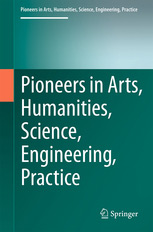
Edited by
Hans Günter Brauch,
AFES-PRESS, chairman
Free University of Berlin (Ret.)
Important Links on Richard Ned Lebow
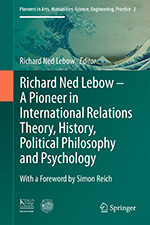
|
Richard Ned Lebow (Ed.): Richard Ned Lebow: A Pioneer in International Relations Theory, History, Political Philosophy and Psychology – Presented by Simon Reich (Cham – Heidelberg –New York – Dordrecht – London: Springer International Publishing, 2016).
ISBN: 978-3-319-34149-1 (Hardcover)
ISBN: 978-3-319-34150-7 (EBook)
Doi: 10.1007/978-3-319-34150-7 (add chapter no.)
Order this book on Springer Website |
| |
|
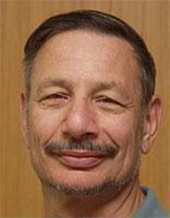 |
Richard Ned Lebow (USA) is Professor of International Political Theory in the Department of War Studies, King's College London and James O. Freedman Presidential Professor Emeritus at Dartmouth College and also a Bye-Fellow of Pembroke College, University of Cambridge He has taught strategy and the National and Naval War Colleges and served as a scholar-in-residence in the Central Intelligence Agency during the Carter administration. He held visiting appointments at the University of Lund, Sciences Po, University of Cambridge, Austrian Diplomatic Academy, Vienna, London School of Economics and Political Science, Australian National University, University of California at Irvine, University of Milano, University of Munich and the Frankfurt Peace Research Institute. He has authored and edited 28 books and nearly 200 peer reviewed articles. Among his most important books are: Franz Ferdinand Lives! A World Without World War 1 (Palgrave-Macmillan, 2014); Constructing Cause in International Relations (Cambridge University Press, 2014); (co-authored with Simon Reich: Good-Bye Hegemony! Power and Influence in the Global System (Princeton University Press, 2014); The politics and ethics of identity: in search of ourselves (Cambridge University Press, 2012); (co-ed. with Erskine, T.): Tragedy and international relations (Palgrave Macmillan, 2012); Forbidden fruit: counterfactuals and international relations (Princeton University Press); Why nations fight: past and future motives for war (Cambridge University Press, 2010); A cultural theory of international relations (Cambridge University Press, 2008); Coercion, cooperation, and ethics in international relations (Routledge, 2007). |
| |
|
On this Book
In a career spanning six decades Richard Ned Lebow has made contributions to the study of international relations, political and intellectual history, motivational and social psychology, philosophy of science, and classics. He has authored, coauthored or edited 30 books and almost 250 peer reviewed articles. These four volumes are excerpts from this corpus. The first volume includes an intellectual autobiography, bibliography, and assessments of Lebow's contributions to diverse fields by noted authorities. It shows how a scholar's agenda evolves in response to world events and his efforts to grapple with them theoretically and substantively. It elaborates pathways for addressing these events and their consequences in an interdisciplinary manner, and offers new concepts and methods for doing so.
- This volume provides an overview of the research of a prominent scholar in the field of international relations and related disciplines. It is the only place an overview is available
- It includes an intellectual biography and assessments of his contributions by eminent authorities.
- There are no similar books about this author.
On the Content
Frontmatter: Dedication - Acknowledgement - Foreword by Simon Reich
Part I: On Richard Ned Lebow: 1 Career as an International Relations Scholar --
Part II: Texts on Richard Ned Lebow: 2 Mervyn Frost: Some Thoughts on Richard Ned Lebow’s The Politics and Ethics of Identity -- 3 Janice Gross Stein: Political Psychology: Deterrence and Conflict -- 4 Stefano Guzzini: Methods and Philosophy of Science: Psychology, Historical -- 5 Markus Kornprobst: Social Psychological Micro-foundations for International Relations -- 6 Harald Mueller: International Relations Theory -- 7 Christian Wendt: Aristos Eikastes – Ned Lebow as a ‘Themistoclean’ Classicist – 8 Robert English: Ned Lebow on the Cold War’s End, and Aftermath
Part III: Texts by Richard Ned Lebow: 9 Thucydides the Constructivist -- 10 Beyond Parsimony: Rethinking Theories of Coercive Bargaining
Part IV: 11 Bibliography of Richard Ned Lebow’s Publications |
| |
On the Contributors
English, Robert D. (USA) is Director of the School of International Relations at the University of Southern California. At USC since 2001, he previously taught at the Johns Hopkins University’s School of Advanced International Studies (1998-2001) and, prior to that, worked as a policy analyst in the U.S. Department of Defense and Committee for National Security (1982-1987). He holds both a Masters of Public Affairs and Doctorate in Politics from Princeton University (1982, 1995) and a Bachelors degree in History and Slavic Studies from the University of California, Berkeley (1980). He is the author, co-author, or editor of three books including Russia and the Idea of the West: Gorbachev, Intellectuals, and the End of the Cold War (Columbia University Press, 2000) as well as articles in such journals as International Security, Diplomatic History, European Review of History, The National Interest and Global Dialogue. English specializes in Russian and post-Soviet international relations, and also teaches courses on political economy and nationalism in post-communist countries.
Frost, Mervyn (South Africa/UK) was educated at the University of Stellenbosch and subsequently, as a Rhodes Scholar, he read Politics at Oxford. He held lectureships at the University of Cape Town and at Rhodes University before being appointed to the Chair of Politics and Head of Department at the University of Natal in Durban. In 1996 he was appointed Professor of International Relations at the University of Kent in Canterbury. He was President of the South African Political Studies Association and editor of its journal Politikon. He is currently on the editorial boards of: International Political Sociology, Journal of International Political Theory, South African Journal of International Affairs, Politics and Governance and International Public Policy Review. He served on the Executive Committee of the International Studies Association (ISA) and was until 2008 Chairman of the International Ethics Section of the ISA. He joined the Department in 2003 as Professor of International Relations in the Centre for International Relations. He served for 6 years as Head of the Department of War Studies from 2007 to 2013.
Gross Stein, Janice (Canada) is the Belzberg Professor of Conflict Management in the Department of Political Science and was the founding Director of the Munk School of Global Affairs at the University of Toronto (serving from 1998 to the end of 2014). She is a Fellow of the Royal Society of Canada and a member of the Order of Canada and the Order of Ontario. Her most recent publications include Networks of Knowledge: Innovation in International Learning (2000); The Cult of Efficiency (2001); and Street Protests and Fantasy Parks (2001). She is a contributor to Canada by Picasso (2006) and the co-author of The Unexpected War: Canada in Kandahar (2007). She was the Massey Lecturer in 2001 and a Trudeau Fellow. She was awarded the Molson Prize by the Canada Council for an outstanding contribution by a social scientist to public debate. She is an Honorary Foreign Member of the American Academy of Arts and Sciences. She has been awarded Honorary Doctorate of Laws by the University of Alberta, the University of Cape Breton, McMaster University, and Hebrew University.
Guzzini, Stefano (Germany/Italy) is Senior Researcher at the Danish Institute for International Studies, Professor of Government at Uppsala University, and Professor of International Relations at PUC-Rio de Janeiro. His research focuses on international theory, security studies (ontological security), approaches to foreign policy analysis, as well as on the conceptual analysis and theories of power. More recently, he has also worked on interpretivist methodologies (process tracing and notions of non-efficient causality) and critical geopolitics as applied to Europe. His research appeared in, among others, European Journal of International Relations, International Organization, Rassegna Italiana di Sociologia, Review of International Political Economy, Review of International Studies, Revue Française de Science Politique, Security Dialogue, and Zeitschrift für Internationale Beziehungen. His most recent publications include The Return of Geopolitics in Europe? Social Mechanisms and Foreign Policy Identity Crises (Cambridge UP, 2012), and Power, Realism and Constructivism (Routledge, 2013), winner of the 2014 ISA Theory Section Best Book Award. He served as the editor of the Journal of International Relations and Development, as a member of the Governing Council of the International Studies Association (ISA) and of the Steering Committee of the Standing Group of International Relations (SGIR) of the ECPR (now EISA), and he currently serves as President of the Central and East European International Studies Association (CEEISA).
Kornprobst, Markus (Austria) holds the Chair of International Relations at the Vienna School of International Studies. Before coming to Vienna, he researched and taught at the Mershon Center at the Ohio State University, the Department of Politics and International Relations at Oxford University and the School of Public Policy at University College London. His research interests encompass Diplomacy and Governance, International Communication, International Peace and Security, International Relations Theory, European Politics, and African Politics. His research appears in leading journals such as the European Journal of International Relations, International Organization, International Studies Review, International Theory, Journal of Modern African Studies, Millennium, Nations and Nationalism, and the Review of International Studies. He is the author of Irredentism in European Politics (Cambridge University Press, 2008), co-author of Understanding International Diplomacy (Routledge, 2013) as well as co-editor of Arguing Global Governance (Routledge, 2010) and Metaphors of Globalization (Palgrave, 2007).
Müller, Harald (Germany), Prof. Dr., is Executive Director of the Peace Research Institute Frankfurt (PRIF), which is Member of the Leibniz Association. He also is Professor of International Relations at Goethe University Frankfurt. From 1999 to 2005 he was member of the Advisory Board on Disarmament Matters of the UN Secretary General, chairing the Board in 2004. Between 2004 and 2005 he was appointed member of the Expert Group on Multilateral Fuel Arrangements of the International Atomic Energy Agency. From 1999 on, he has been co-chairing the Working Group on Peace and Conflict at the German Foreign Office’s Planning Staff. Since 2007 he is member of the Board of Directors of the Cluster of Excellence “The Formation of Normative Orders” at – Goethe University Frankfurt, and since 2010 Vice-President of the EU Consortium for Non-proliferation and Disarmament. His research focuses on disarmament issues, great power relations and transatlantic relations. His most recent books are “Building a New World Order. Sustainable Policies for the Future”, London, Haus Publishing 2009; “The Militant Face of Democracy. Liberal Forces for Good”, Cambridge, Cambridge University Press 2013 (co-edited with Anna Geis and Niklas Schörnig), and “Norm Dynamics in Multilateral Arms Control. Interests, Conflicts, and Justice”, University of Georgia Press 2013 (co-edited with Carmen Wunderlich).
Simon Reich (USA) holds an appointment as a professor in the Division of Global Affairs and Department of Political Science at Rutgers Newark. He is author or editor of ten books and over fifty articles and book chapters. His work has been published in Governance, International Interactions, International Organization, International Security, and the Review of International Political Economy. Reich's work has been translated into Dutch, French, German and Japanese. Reich’s most recent book, Good-bye Hegemony! Power and Influence in the Global System (with Richard Ned Lebow), was published in the spring of 2014 by Princeton University Press. It will be translated and published in Chinese. His new major project focuses on American Grand Strategy in the 21st Century. Reich’s public service has included working at the US Congressional Office of Technology Assessment, as Director of Research and Analysis at the Royal Institute for International Affairs (Chatham House), and as inaugural director of the Ford Institute for Human Security at the University of Pittsburgh.
Wendt, Christian (Germany) Prof. Dr., is Juniorprofessor of Ancient History at Freie Universität Berlin (Friedrich-Meinecke-Institut). He is also the head of the Berlin Thucydides Center (BTC). From 2009 to 2013, he directed a DFG-funded project on “Die (Ohn-)Macht des Stärkeren. Thukydides und die interpolitische Ordnung”. Since 2012, he is principal investigator in the Excellence Cluster “TOPOI. Space and Knowledge in the Ancient World”, a cooperation of Freie Universität and Humboldt-Universität Berlin with the Berlin-Brandenburgische Akademie der Wissenschaften, the Stiftung Preußischer Kulturbesitz and many other partners. His books include Sine fine. Die Entwicklung der römischen Außenpolitik von der späten römischen Republik bis in den frühen Prinzipat (67 v.Chr.-68 n.Chr.), Berlin 2008; Ein Besitz für immer? Geschichte, Polis und Völkerrecht bei Thukydides, Baden-Baden 2011 (co-edited with Ernst Baltrusch); 2000 Jahre Varusschlacht. Geschichte – Archäologie – Legenden, Berlin/New York 2012 (co-edited with Ernst Baltrusch, Morten Hegewisch, Michael Meyer and Uwe Puschner); and Thucydides and Political Order, New York 2015 (co-edited with Christian Thauer).
|
| |
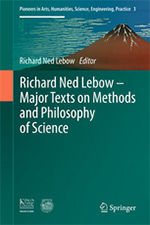 |
Richard Ned Lebow (Ed.): Richard Ned Lebow: Major Texts on Methods and Philosophy of Science (Cham – Heidelberg –New York – Dordrecht – London: Springer International Publishing, 2016)..
ISBN : 978-3-319-40026-6 (Hardcover)
ISBN : 978-3-319-40027-3 (Ebook)
Doi: 978-3-319-40027-3 (add chapter no.)
Order this book on Springer Website |
| |
|
On this Book
This second volume includes texts on causation, epistemology and methods, especially counterfactual analysis.
-
This volume provides an overview of the research of a prominent scholar in the field of epistemology and research methods.
-
It offers students of international relations and history a set of tools for using counterfactual experiments to probe complex causation.
-
There are many books in philosophy of science but none that directly compete. The author's approach is original and focused on international relations.
On the Content
Frontmatter: Dedication - Acknowledgement –
1 Introduction – 2 What Can We Know? How Do We Know? – 3 Social Science as Case-Based Diagnostics (coauthored with Steven Bernstein, Janice Gross Stein, and Steven Weber – 4 If Mozart Had Died at Your Age: Psychologic vs. Statistical Inference – 5 Texts, Paradigms and Political Change – 6 Constructing Cause in International Relations
|
| |
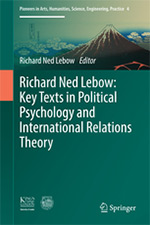 |
Richard Ned Lebow (Ed.): Richard Ned Lebow: Key Texts in Political Psychology and International Relations Theory (Cham – Heidelberg –New York – Dordrecht – London: Springer International Publishing, 2016).
ISBN: 978-3-319-39963-8 (Hardcover)
ISBN: 978-3-319-39964-5 (EBook)
Doi: 10.1007/978-3-319-39964-5_ (add chapter no.)
Order this book on Springer Website |
| |
|
On this Book
This third volume includes texts on psychology and international relations, causation, counterfactual analysis. The political psychology contributions draw on richer, ancient Greek understandings of the psyche and offer novel insights into strategies of conflict management, the role of emotions in international relations, and the modern fixation on identity. The volume provides an overview of the research of a prominent scholar in the field of political psychology.
The excerpts are interdisciplinary studies that use short stories, experiments, and cas studies to develop new approaches to conflict management and decisionmaking, but also reveal how difficult it is for policymakers to confront problems of complex causation.
There are no similar books about this author
On the Content
Frontmatter: Dedication - Acknowledgement –
1 Introduction – 2 Deterrence: A Political and Psychological Critique – 3 Forbidden Fruit: Counterfactuals and International Relations – 4 Poking Counterfactual Holes in Covering Laws: Cognitive Styles and Political Learning – 5 The Politics and Ethics of Identity: In Search of Ourselves – 6 Reason, Emotions and the Greeks
|
| |
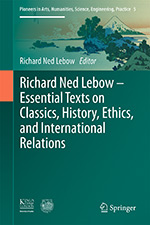 |
Richard Ned Lebow (Ed.): Richard Ned Lebow: Essential Texts on Classics and History and Ethics and International Relations (Cham – Heidelberg –New York – Dordrecht – London: Springer International Publishing, 2016).
ISBN: 978-3-319-40023-5 (Hardcover)
ISBN: 978-3-319-40024-2 (EBook)
Doi: 10.1007/978-3-319_ (add chapter no.)
Order this book on Springer Website |
| |
On this Book
This fourth volume includes texts on psychology and international relations, tragedy and international relations, and ethics and international relations.
-
The volume provides an overview of the research of a prominent scholar in the field of political psychology
-
The excerpts are interdisciplinary studies that use psychology to shed new light on decisionmaking, conflict management, the role of reason and emotions, and the historical context of international relations theory.
-
There are no similar books about this author.
On the Content
Frontmatter: Dedication - Acknowledgement –
1 Introduction – 2 Making Sense of the World – 3 Understanding Tragedy and Understanding International Relations – 4 Learning from Tragedy and Refocusing International Relations – 5 German Jews and American Realism – 6 Nixon in Hell – 7 Robert S. McNamara: Max Weber’s Nightmare
Backmatter: On Dartmouth College – On King’s College – Cambridge University – Pembroke College – On the author – On the Co-author
|
| |
On the Author’s Videos and Podcasts
|
| |
| |
On Richard Ned Lebow’s Books
Books and Monographs
|
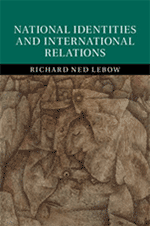 |
National Identities and International Relations (
Cambridge: Cambridge University Press, 2016).. |
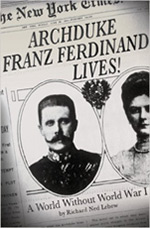 |
Archduke Franz Ferdinand Lives!
A World Without World War I
(New York: Palgrave-Macmillan, 2014). |
| |
|
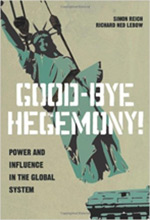 |
Good-Bye Hegemony!
Power and Influence in the Global System,
co-authored with Simon Reich
(Princeton: Princeton University Press, 2014). |
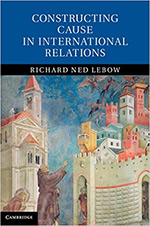 |
Constructing Cause in International Relations
(Cambridge: Cambridge University Press, 2014) |
| |
|
|
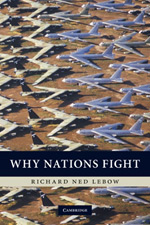 |
Why Nations Fight:
Past and Future Motives for War
(Cambridge: Cambridge University Press, 2010).
Chinese translation
(Shanghai: Academy of Social Sciences Press, 2013). |
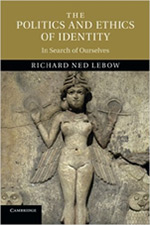 |
The Politics and Ethics of Identity:
In Search of Ourselves
(Cambridge: University Press, 2012). |
| |
|
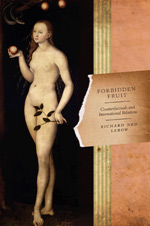 |
Forbidden Fruit:
Counterfactuals and International Relations
(Princeton: Princeton University Press, 2010). |
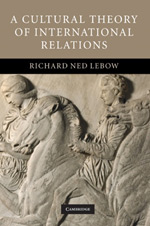 |
A Cultural Theory of International Relations
(Cambridge: Cambridge University Press, 2008).
Chinese translation
(Shanghai: Academy of Social Sciences Press, 2012). |
| |
|
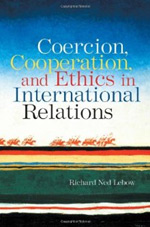 |
Coercion, Cooperation and Ethics
(New York: Routledge, 2006). |
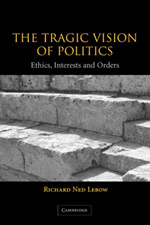 |
The Tragic Vision of Politics:
Ethics, Interests and Orders
(Cambridge: Cambridge University Press, 2003). |
| |
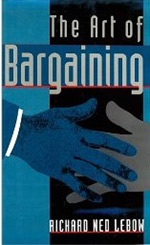 |
The Art of Bargaining
(Baltimore: Johns Hopkins University Press, 1996). |
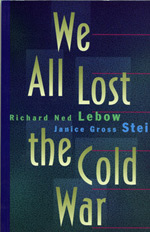 |
We All Lost the Cold War,
co-authored with Janice Gross Stein
(Princeton: Princeton University Press, 1994). |
| |
|
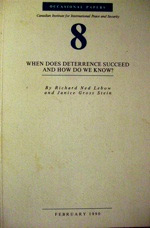 |
When Does Deterrence Succeed
and How Do We Know?
co-authored with Janice Gross Stein
(Ottawa: Canadian Institute for International Peace and Security, 1990).
French translation, 1990. |
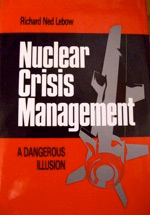 |
Nuclear Crisis Management:
A Dangerous Illusion
(Ithaca: Cornell University Press, January 1987). |
| |
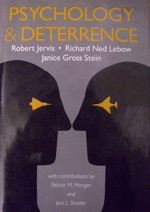 |
Psychology and Deterrence,
co-authored with Robert Jervis and Janice Gross Stein
(Baltimore: The Johns Hopkins University Press, 1985). |
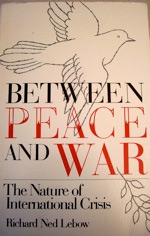 |
Between Peace and War:
The Nature of International Crisis
(Baltimore: Johns Hopkins University Press, 1981). |
| |
|
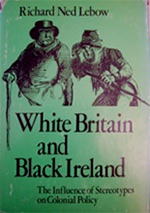 |
White Britain and Black Ireland:
Social Stereotypes and Colonial Policy
(Philadelphia: Institute for the Study of Human Issues, 1976). |
|
| |
| |
|
|
| |
Edited Books |
|
| |
Max Weber and International Relations
(under review). |
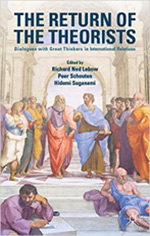 |
Return of the Theorists:
Dialogues with Dead Thinkers,
co-edited with Peer Schouten and Hidemi Suganami
(London: Palgrave-Macmillan, 2016). |
| |
|
|
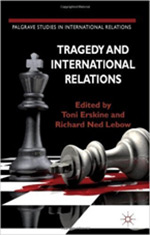 |
Tragedy and International Relations,
co-edited with Toni Erskine
(London: Palgrave-Macmillan, 2012).
|
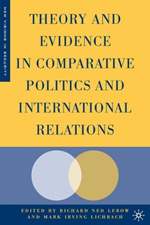 |
Theory and Evidence in
Comparative Politics and International Relations,
co-edited with Mark I. Lichbach
(New York: Palgrave-Macmillan, 2007). |
| |
|
|
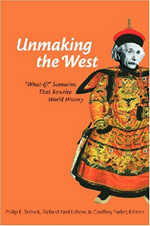 |
Unmaking the West:
“What-If” Scenarios that Rewrite World History,
co-edited with Philip Tetlock and Geoffrey Parker
(Ann Arbor: University of Michigan Press, 2006). |
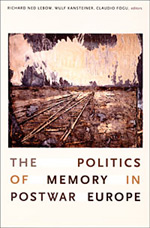 |
The Politics of Memory in Postwar Europe,
co-edited with Claudio Fogu and Wulf Kansteiner
(Duke University Press, 2006). |
| |
|
|
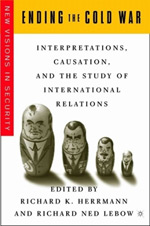 |
Ending the Cold War,
co-edited with Richard K. Herrmann
(New York: Palgrave-Macmillan, 2003). |
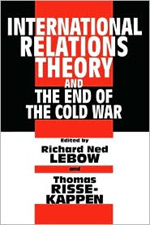 |
International Relations Theory and
the End of the Cold War,
co-edited with Thomas Risse-Kappen
(New York: Columbia University Press, 1995). |
| |
|
|
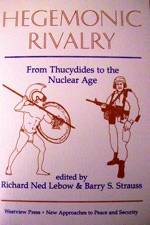 |
Hegemonic Rivalry:
From Thucydides to the Nuclear Age,
co-edited with Barry R. Strauss
(Boulder, Co.: Westview Press, 1991). |
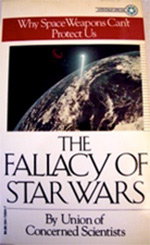 |
The Fallacy of Star Wars,
co-authored with Hans Bethe, Richard Garwin,
Kurt Gottfried, Henry Kendall, et al.
(New York: Random House, 1984). |
| |
|
|
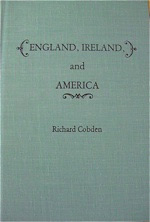 |
Richard Cobden, England, Ireland and America
(Philadelphia: Institute for the Study of Human Issues, 1980). |
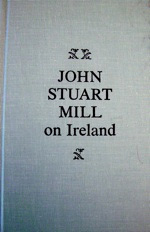 |
John Stuart Mill on Ireland
(Philadelphia: Institute for the Study of Human Issues, 1979). |
| |
|
|
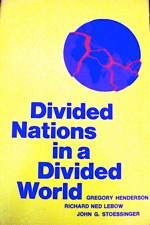 |
Divided Nations in a Divided World,
co-authored and edited with Gregory Henderson
and John G. Stoessinger
(New York: David McKay, 1974).
|
|
| |
| |
|
|
| |
|
On the Author’s Academic Institutions
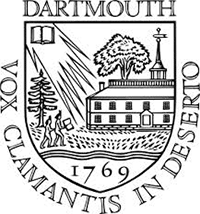
On Dartmouth College, N.H., USA
Founded in 1769, Dartmouth is a member of the Ivy League and consistently ranks among the world's greatest academic institutions. Home to a celebrated liberal arts curriculum and pioneering professional schools, Dartmouth has shaped the education landscape and prepared leaders through its inspirational learning experience. Dartmouth has forged a singular identity for combining its deep commitment to outstanding undergraduate liberal arts and graduate education with distinguished research and scholarship in the Arts & Sciences.
The charter establishing Dartmouth was signed in 1769, by John Wentworth, the Royal Governor of New Hampshire, establishing an institution to offer “the best means of education.” Dartmouth’s founder, the Rev. Eleazar Wheelock, a Congregational minister from Connecticut, established the College as an institution to educate Native Americans. Samson Occom, a Mohegan Indian and one of Wheelock’s first students, was instrumental in raising the funds necessary to found the College. In 1972 it established one of the first Native American Programs in the country.
Dartmouth was the subject of a landmark U.S. Supreme Court case in 1819, Dartmouth College v. Woodward, in which the College prevailed against the State of New Hampshire, which sought to amend Dartmouth’s charter. The case is considered to be one of the most important and formative documents in United States constitutional history, strengthening the Constitution's contract clause and thereby paving the way for American private institutions to conduct their affairs in accordance with their charters and without interference from the state.
Ranked No. 1 in undergraduate teaching for the last four consecutive years by U.S. News & World Report and recognized by the Carnegie Foundation as a “research university with very high research activity,” Dartmouth combines elite academics with thriving research and scholarship.
For more than a quarter of a century, Dartmouth has hosted debates featuring presidential candidates. The College is a frequent stop on the campaign trail, giving students the chance to experience first-hand New Hampshire’s first-in-the-nation presidential primary that every four years attracts candidates hoping to woo voters locally and capture attention nationally.
Dartmouth College educates the most promising students and prepares them for a lifetime of learning and of responsible leadership, through a faculty dedicated to teaching and the creation of knowledge.
-
Dartmouth expects academic excellence and encourages independence of thought within a culture of collaboration.
-
Dartmouth faculty are passionate about teaching our students and are at the forefront of their scholarly or creative work.
-
Dartmouth embraces diversity with the knowledge that it significantly enhances the quality of a Dartmouth education.
-
Dartmouth recruits and admits outstanding students from all backgrounds, regardless of their financial means.
-
Dartmouth fosters lasting bonds among faculty, staff, and students, which encourage a culture of integrity, self-reliance, and collegiality and instill a sense of responsibility for each other and for the broader world.
-
Dartmouth supports the vigorous and open debate of ideas within a community marked by mutual respect.
Since its founding in 1769 Dartmouth has provided an intimate and inspirational setting where talented faculty, students, and staff contribute to the strength of an exciting academic community that cuts easily across disciplines. Dartmouth is home to about 4,200 undergraduates in the liberal arts and 1,900 graduate students in more than 25 advanced degree programs in the Arts & Sciences and at Dartmouth’s professional schools: the Geisel School of Medicine, Thayer School of Engineering, and the Tuck School of Business. Dartmouth is also the first school in the world to offer a graduate degree in health care delivery science. Dartmouth faculty and student research contributes substantially to the expansion of human understanding.
Richard Ned Lebow is James O. Freedman Presidential Professor Emeritus; Professor of International Political Theory, Dept. of War Studies, King's College London; Bye-Fellow, Pembroke College, University of Cambridge
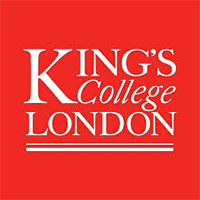
On King’s College, London, UK
King's College London was founded by King George IV and the Duke of Wellington (then Prime Minister) in 1829 as a university college in the tradition of the Church of England. The University of London was established in 1836 with King's and University College London (UCL, founded in 1826) its two founding colleges.
It now welcomes staff and students of all faiths and beliefs. King's professors played a major part in nineteenth-century science and in extending higher education to women and working men through evening classes. The university has grown and developed through mergers with several institutions each with their own distinguished histories. These include:
The staff and alumni of King's and its constituent institutions made major contributions to 19th-century science, medicine and public life, including Florence Nightingale. In the 20th century eight people from these institutions were awarded the Nobel Prize, among them Desmond Tutu and Peter Higgs.
King's College London is dedicated to the advancement of knowledge, learning and understanding in the service of society. King's College London has a Faculty of Arts & Humanities, a Faculty of Life Sciences & Medicine, Faculty of Natural & Mathematical Sciences, Florence Nightingale Faculty of Nursing & Midwifery, Faculty of Social Science & Public Policy that include i.a. the Defence Studies Department, Institute of Middle Eastern Studies, Policy Institute at King's, Political Economy, War Studies and War Studies Online (distance learning). Furthermore King’s college had in 2015 seven global institutes: African Leadership Centre, Brazil Institute, India Institute, Institute of North American Studies, International Development Institute, Lau China Institute and Russia Institute.
Department of War Studies
King’s College established the Department of War Studies department in February 1962, with the first intake of students in September that year. The War Studies Group—comprising the departments of War Studies and Defence Studies—contributes to public life, participates in national and international networks, maintaining its international reputation for excellence in scholarship and policy-relevant research. The Department of War Studies is
-
The only academic department in the world to focus solely on the complexities of conflict and security.
-
Students are taught by experts and pioneers in their fields who are at the forefront of world events as they happen.
-
Stellar academic cohort bring an extensive and continually growing network of national and international links around the world for students to take advantage of.
-
Extensive range of events throughout the year hosting world leading speakers.
-
Established relationships and links with major London institutions.
-
Our location is close to government – physically as well as intellectually.
The Department of War Studies is committed
-
To undertake and publish world-leading, cutting edge research
-
To provide outstanding, research-led teaching and training to the best students it can recruit.
-
To disseminate knowledge generated within the Department through a range of knowledge transfer courses.
-
To contribute to public life, participating in national and international networks, maintain-ing its international reputation for excellence in scholarship and policy-relevant research
The Department of War Studies (DWS) is the largest European university group of scholars focused on research relating to all aspects of war, peace, security and international relations past, present and future seeking to
-
produce world-leading research that develops new empirical knowledge, employs innovative theory, and addresses vital policy issues
-
contribute to scholarly learning through high-quality publications, and to achieve impact through engagement and knowledge exchange with policymakers, parliamentarians, publics and industry in Britain and beyond.
-
develop the next generation of scholars in international, policy, and security studies through postgraduate training and research mentoring
-
support individual scholarship and research collaboration through excellent research resources and effective research mentoring;
-
produce world-class scholarship through collaboration across the College and with international partners
Its Impact Strategy seeks to leverage the experience of colleagues with proven track records of achieving impact by sharing best practice with new research communities and early career researchers.
A cross-departmental research mentoring scheme is operated by the Department of War Studies, the Defence Studies Department, the Department for European and International Studies, the Department of Political Economy and the Global Institutes. This scheme allows for early career researchers to select a research mentor from outside their department within the Faculty of Social Science and Public Policy. It reflects the breadth and depth of academic experience located across the School and allows colleagues to engage with mentors that possess the most suitable research specialism and experience. Research mentors provide advice on research, writing, dissemination/publishing, funding, impact, networking and project design. In the War Studies Department, Richard Ned Lebow is Professor of International Political Theory. He is teaching for BA students on Causes, Contigency & War and for MA students on Causation in International Relations, Politics and Ethics, Theories in IR, Concepts and Methods and Ancient Greek Conceptions of Order, Justice and War.
See for more information at:
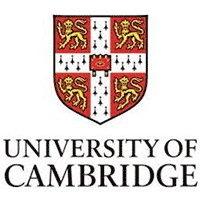
The University of Cambridge is rich in history as one of the world's oldest universities and leading academic centres, and a self-governed community of scholars. In 2009, Cambridge celebrated its 800th anniversary. Its reputation for outstanding academic achievement is known world-wide and reflects the intellectual achievement of its students, as well as the world-class original research carried out by the staff of the University and the Colleges.
The reputation of Cambridge scientists had already been established in the late nineteenth century by Clerk Maxwell and the Darwins among others and was maintained afterwards by J. J. Thomson, Lord Rayleigh and Lord Rutherford. Work done by their pupils and associates during the Second World War greatly increased this reputation and large numbers of students flocked to the University and to government-sponsored institutions. University departments and research institutes were established as new areas of study developed. The 1950s and 1960s saw an unprecedented expansion of the University's teaching accommodation and the growing arts faculties received permanent accommodation for the first time.
The undergraduate numbers were increased after the war by the admission from 1947 of women students, by the foundation of a third women's College, New Hall (1954), as well as the foundation of Churchill (1960) and Robinson (1977). In the 1960s, four new Colleges were established for the growing number of teaching and research staff, as well as more places for research students. The older men’s Colleges now began to admit women students and appoint women Fellows. Now 'co-residence' is usual, but three Colleges admit women students only - Newnham, New Hall, and Lucy Cavendish.
See at: <http://www.cam.ac.uk/>
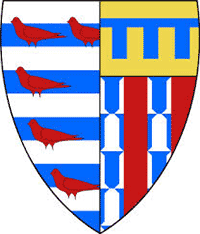
Pembroke College
Pembroke College, founded in 1347 by Marie de St Pol, Countess of Pembroke, is the third oldest of the Cambridge colleges. Openness characterises Pembroke today. The College is an intimate yet diverse community, committed to welcoming students of exceptional talent regardless of their social, cultural or educational background, and giving them the benefit of contact with a large and distinguished Fellowship. Pembroke thrives on conversations, between generations and disciplines – between undergraduates, graduates and senior Members, between current students and our alumni, and between the academy and the wider world.
At Pembroke College, there are around 440 undergraduate students studying for a degree at Pembroke. Pembroke also encourages the kind of inter-disciplinary discussions between staff and students in different subjects. The College is keen for its graduates to establish links with Fellows and other students in the same discipline and also offers graduates the opportunity of meeting people from other disciplines. At Pembrooke College, Professor Richard Ned Lebow has been a Bye-fellow in the field of international relations since 2011.
For details see at:
|
|
|
|